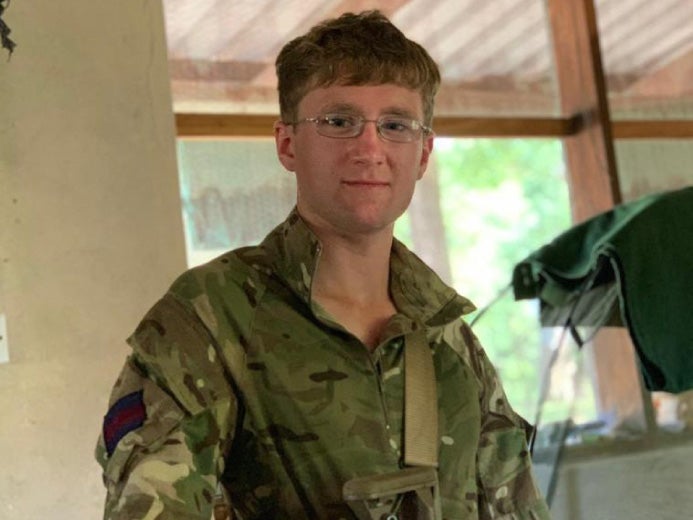British soldier tried to climb tree to flee fatal elephant charge, inquest told
The soldier died aged 22 during an anti-poaching patrol in Malawi in 2019

Your support helps us to tell the story
From reproductive rights to climate change to Big Tech, The Independent is on the ground when the story is developing. Whether it's investigating the financials of Elon Musk's pro-Trump PAC or producing our latest documentary, 'The A Word', which shines a light on the American women fighting for reproductive rights, we know how important it is to parse out the facts from the messaging.
At such a critical moment in US history, we need reporters on the ground. Your donation allows us to keep sending journalists to speak to both sides of the story.
The Independent is trusted by Americans across the entire political spectrum. And unlike many other quality news outlets, we choose not to lock Americans out of our reporting and analysis with paywalls. We believe quality journalism should be available to everyone, paid for by those who can afford it.
Your support makes all the difference.A soldier that was killed by a charging elephant had tried to climb a tree to escape, his comrade said in an inquest that started today.
Coldstream Guardsman Mathew Talbot, from Great Barr in the West Midlands, died from his injuries on 5 May 2019 while on an eight-day and five-man anti-poaching patrol in Liwonde National Park in Malawi.
The patrol leader, Lance Sergeant Robert Padgham, told Oxford Coroner’s Court how he and Gdsm Talbot, 22, had to climb trees to escape the elephant stampede.
In evidence to the hearing via video-link, he said – reading from a statement: “I recall that we were patrolling directly west.
“At about 10.00 hours we were patrolling through elephant grass, which is roughly seven feet in height and visibility is limited.
“An elephant appeared roughly five metres to my right.”
He told the inquest that he, LSgt Padgham, and the three park rangers began running in different directions.
The soldier said: “The lead ranger gave the signal for dangerous game to the front. We started to back off and then from my right it came charging through so we just dispersed, like we were taught.”
As Gdsm Talbot attempted to climb a “prominent branch” of a tree, he was being “thrown” and “knocked” into the air by an elephant making a sweeping movement with its head – LSgt Padgham told the court.
LSgt Padgham, who also climbed a tree to escape, said he went down to the ground to pull Gdsm Talbot into the cover of a tree, before giving first aid, and helping to carry him on a stretcher to a vehicle pick-up point.
He said that, at some point during the elephant charge, he had lit and thrown a firecracker in an attempt to scare the herd away.
Soldiers on anti-poaching patrols had been taught to fire warning shots, to scare away animals, only as a last resort – LSgt Padgham added.
But he said that we “would have fired a warning shot” if he were “in a position to” do so in that situation.
In explaining why he had not fired a warning shot after his climbed a tree during the elephant stampede, LSgt Padgham said: “The sharpshooter [rifle] is quite long-barrelled.
“I was hanging on the tree with one hand. I didn’t want to fire a shot in the direction where the animal was in case of hitting Mathew.”
A report into Gdsm Talbot’s death had identified the “leadership and personal strength” of LSgt Padgham in evacuating his comrade on a stretcher and controlling a haemorrhage as being “initially life-saving” – the inquest heard.
Statements were read to the hearing on behalf of the three park rangers who took part in the patrol.
One of the rangers said he fired a warning shot to scare off an elephant after he was aware of it running towards him.
The inquest, sitting without a jury, follows a Ministry of Defence (MoD) service inquiry, published last year, which highlighted shortcomings in estimating how long it would take to get a casualty from a remote location to the nearest hospital.
In September 2019, the Duke of Sussex laid a wreath for Gdsm Talbot at a memorial during a visit to Liwonde National Park.
His handwritten message attached to the wreath read: “In grateful memory of Guardsman Talbot who made the ultimate sacrifice in the service of his country and conservation. Rest in Peace.”
The inquest will hear evidence over two weeks, covering the command and management of the incident, preparation and procedures in force in Malawi, and the resources available at the time.
The hearing continues.
Join our commenting forum
Join thought-provoking conversations, follow other Independent readers and see their replies
Comments